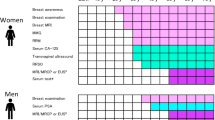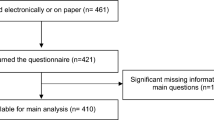Abstract
BRCA1/2 genetic testing to use PARP inhibitor for breast cancer has a possibility of the “secondary finding” among the younger nonaffected family members of the patient, which turns them into at-risk for hereditary breast cancer. Proper understanding of the background of the hereditary cancer is now required for appropriate acceptance of the risk. Therefore, we investigated the level of knowledge and attitudes of younger women on hereditary breast cancer in Japan. Study subject was Japanese university women between 20 and 30 years of age, without medical history of breast cancer. We conducted the anonymous self-answering questionnaire to them. We received responses from 353 women. The levels of knowledge, awareness, and interest were relatively high. Women with a family history of breast cancer were less likely to undergo testing than women without (92.8% vs. 74.5%, p < 0.001). The rates of positive response toward risk-reducing mastectomy (RRM) and risk-reducing salpingo-oophorectomy (RRSO) was significantly high for medical majors compared with that for other majors (RRM: medical 71.6% vs. science 54.5% vs. humanities 53.8%, p = 0.008, RRSO: 35.4% vs. 36.3% vs. 48.4%, p = 0.027). Approximately half of respondents answered that they would hesitate to get married (45.3%) or to have children (55.4%), if they were a BRCA1/2 mutation carrier. The results may help to establish the methods for supporting the decision-making for reproduction of younger women who are unexpectedly labeled as being at-risk for HBOC.
This is a preview of subscription content, access via your institution
Access options
Subscribe to this journal
Receive 12 print issues and online access
$259.00 per year
only $21.58 per issue
Buy this article
- Purchase on Springer Link
- Instant access to full article PDF
Prices may be subject to local taxes which are calculated during checkout

Similar content being viewed by others
References
Daly MB, Pilarski R, Berry M, Buys SS, Farmer M, Friedman S, et al. NCCN Guidelines Insights: Genetic/Familial High-Risk Assessment: Breast and Ovarian, Version 2.2017. J Natl Compr Canc Netw. 2017;15:9–20.
Demsky R, McCuaig J, Maganti M, Murphy KJ, Rosen B, Armel SR. Keeping it simple: genetics referrals for all invasive serous ovarian cancers. Gynecol Oncol. 2013;130:329–33.
Morgan D, Sylvester H, Lucas FL, Miesfeldt S. Cancer prevention and screening practices among women at risk for hereditary breast and ovarian cancer after genetic counseling in the community setting. Fam Cancer. 2009;8:277–87.
Forman AD, Hall MJ. Influence of race/ethnicity on genetic counseling and testing for hereditary breast and ovarian cancer. Breast J. 2009;15:S56–62.
Terui-Kohbata H, Yotsumoto J, Aoki M, Oishi Y, Uchida N, Akagi K, et al. Barriers to genetic counseling of hereditary breast and ovarian cancer in Japan. Iryo Shakai. 2017;27:261–75.
Nakagomi H, Sakamoto I, Hirotsu Y, Amemiya K. Willingness of Japanese patients with breast cancer to have genetic testing of BRCA without burden of expenses. Breast Cancer. 2016;23:649–53.
Chin TM, Tan SH, Lim SE, Iau P, Yong WP, Wong SW, et al. Acceptance, motivators, and barriers in attending breast cancer genetic counseling in Asians. Cancer Detect Prev. 2005;29:412–8.
Sussner KM, Jandorf L, Thompson HSVH. Barriers and facilitators to BRCA genetic counseling among at-risk Latinas in New York City. Psychooncology. 2013;22:1594–604.
Anderson B, McLosky J, Wasilevich E, Lyon-Callo S, Duquette D, Copeland G. Barriers and facilitators for utilization of genetic counseling and risk assessment services in young female breast cancer survivors. J Cancer Epidemiol. 2012;2012:9–11.
Mellon S, Gauthier J, Cichon M, Hammad A, Simon MS. Knowledge, attitudes, and beliefs of arab-american women regarding inherited cancer risk. J Genet Couns. 2013;22:268–76.
Shirai Y. Idenshi shindan o meguru rinri teki mondai. Byoin. 2001;60:1027–30.
Matsumoto T, Morifuji K, Sasaki N, Araki M, Yamasaki M, Miyahara H, et al. Image of genetics. Nagasaki daigaku igakubu hoken gakka kiyo (Bull Nagasaki Univ Sch Heal Sci). 2004;17:17–20.
Charles S, Kessler L, Stopfer JE, Domchek S, Halbert CH. Satisfaction with genetic counseling for BRCA1 and BRCA2 mutations among African American women. Patient Educ Couns. 2006;63:196–204.
Ando N, Iwamitsu Y, Kuranami M, Okazaki S, Yamamoto K, Watanabe M, et al. Concerns about inherited risk of breast cancer prior to diagnosis in Japanese patients with breast complaints. Fam Cancer. 2011;10:681–9.
Fortuny D, Balmaña J, Graña B, Torres A, TRY Cajal, Darder E, et al. Opinion about reproductive decision making among individuals undergoing BRCA1/2 genetic testing in a multicentre Spanish cohort. Hum Reprod. 2009;24:1000–6.
Chan JL, Johnson LNC, Sammel MD, DiGiovanni L, Voong C, Domchek SM, et al. Reproductive decision-making in women with BRCA1/2 mutations. J Genet Couns. 2017;26:594–603.
Derks-Smeets IA, Gietel-Habets JJ, Tibben A, Tjan-Heijnen VC, Meijer-Hoogeveen M, Geraedts JP, et al. Decision-making on preimplantation genetic diagnosis and prenatal diagnosis: a challenge for couples with hereditary breast and ovarian cancer. Hum Reprod. 2014;29:1103–12.
Gietel-Habets JJ, de Die-Smulders CE, Derks-Smeets IA, Tibben A, Tjan-Heijnen VC, van Golde R, et al. Awareness and attitude regarding reproductive options of persons carrying a BRCA mutation and their partners. Hum Reprod. 2017;32:588–97.
Donnelly LS, Watson M, Moynihan C, Bancroft E, Evans DGR, Eeles R, et al. Reproductive decision-making in young female carriers of a BRCA mutation. Hum Reprod. 2013;28:1006–12.
Gietel-Habets JJG, de Die-Smulders CEM, Derks-Smeets IAP, Tibben A, Tjan-Heijnen VCG, van Golde R, et al. Support needs of couples with hereditary breast and ovarian cancer during reproductive decision making. Psychooncology. 2018;27:1795–801.
Acknowledgements
This survey was supported by Tokyo Interdisciplinary Life Science Consortium. We appreciate Ms Mariko Nakagawa for helping data processing. This research was supported by JSPS KAKENHI Grant number JP17K17689.
Author information
Authors and Affiliations
Corresponding author
Ethics declarations
Conflict of interest
The authors declare that they have no conflict of interest.
Additional information
Publisher’s note Springer Nature remains neutral with regard to jurisdictional claims in published maps and institutional affiliations.
Rights and permissions
About this article
Cite this article
Terui-Kohbata, H., Egawa, M., Yura, K. et al. Knowledge and attitude of hereditary breast cancer among Japanese university female students. J Hum Genet 65, 591–599 (2020). https://doi.org/10.1038/s10038-020-0743-9
Received:
Revised:
Accepted:
Published:
Issue Date:
DOI: https://doi.org/10.1038/s10038-020-0743-9



